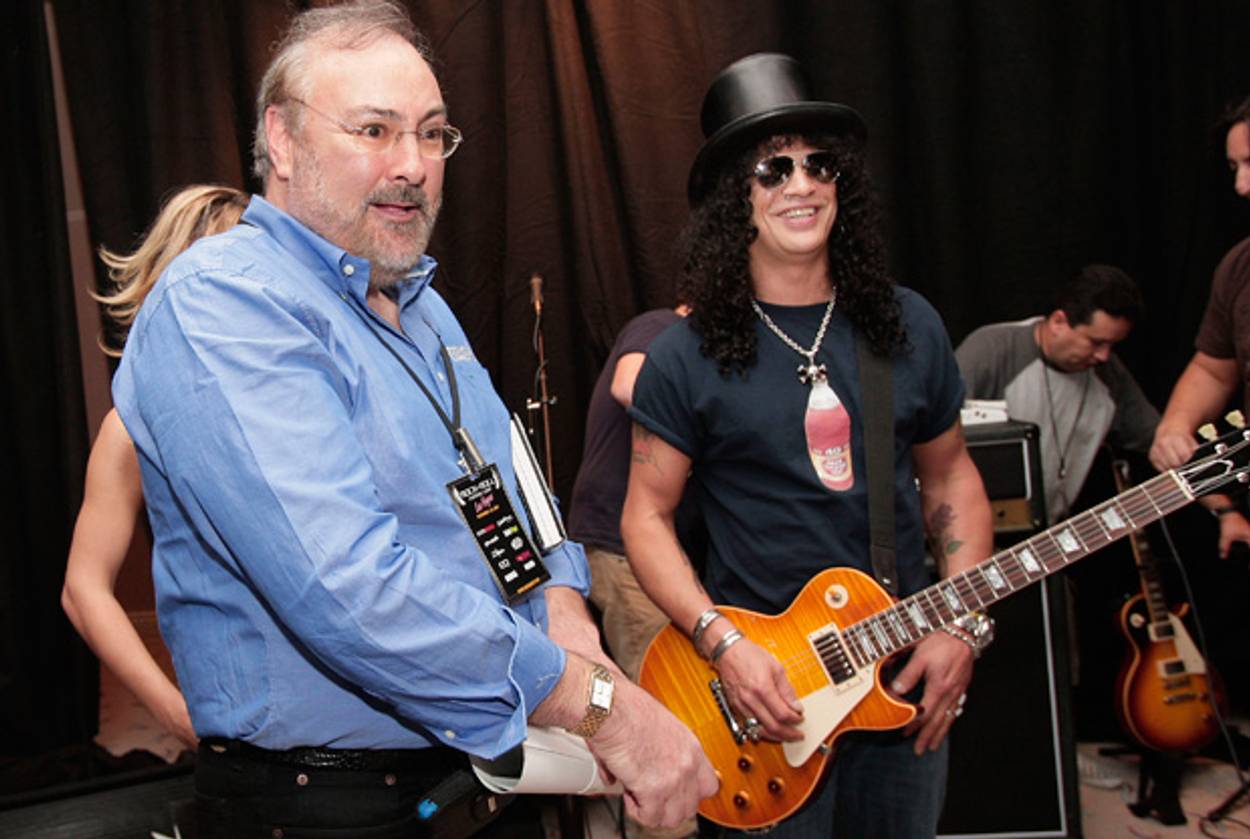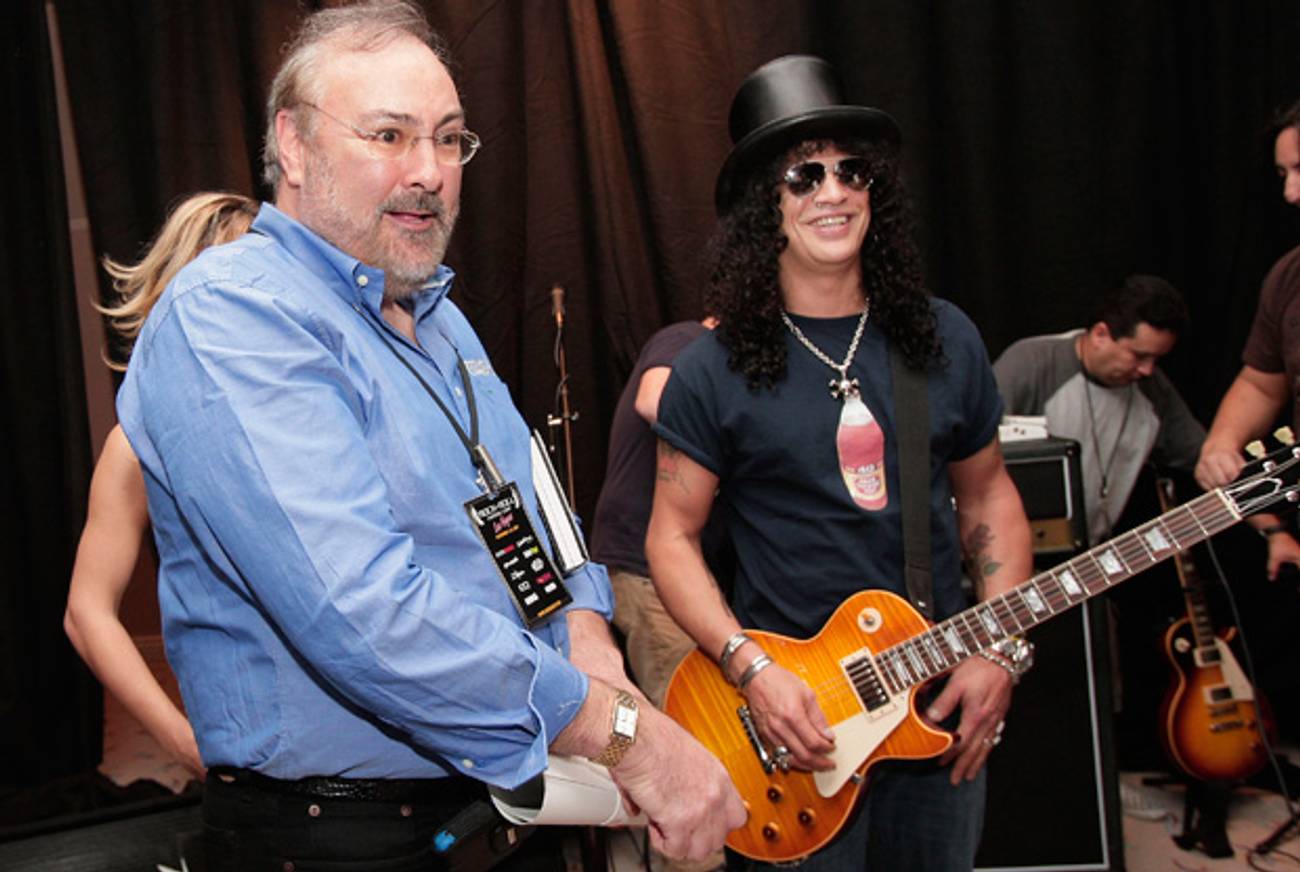Let David Fishof Entertain You
The impresario on his new book, likely the only one to feature both Bon Jovi and the Bobover Rebbe in the index




The most frequently recurring sentence in conversation with David Fishof is “it was the greatest night of my life.” He’s not being hyperbolic; the nights all qualify.
There was the night he brought the Monkees back from the dead, for example, and all those nights spent on the road with Ringo Starr, and the night he conceived of his best-known enterprise, rock ’n’ roll fantasy camp. All of these nights have made Fishof one of the entertainment industry’s most successful impresarios and inspired him to share his insights in a new book, Rock Your Business. Most likely, it is the only book ever published that features Jon Bon Jovi and the Bobover Rebbe next to each other in its index.
Fishof began his career as a teenage waiter in a slew of Catskills hotels but soon realized that life was easier and more luminous on the other side of the banquet hall, on stage with the entertainers. But his father, a Holocaust survivor and a cantor, gave him one piece of advice. “Why do you want to be a musician?” Fishof recalled his father saying. “Be backstage. You could book six bands at a time and make more money.”
Fishof took these words to heart. Before long, he was the official manager of Herschel Bernardi, an actor and a comedian best recognized for lending his voice to StarKist’s animated mascot, Charlie the Tuna. Other Jewish entertainers followed suit.
Comedy, however, was often grim business. “Sometimes hotel owners would deduct money if they thought the guy wasn’t funny,” Fishof told me. As he struggled to book comics, Fishof noticed that there was another class of celebrity on the Catskills’ circle, much more revered and much better compensated than his clients: athletes. “The ball players would show up, and the entire camp waited out on the road to meet them. When Dr. J made an appearance, the kids went nuts. And all the guy does is shoot baskets and sign autographs,” Fishof recalled. “I wanted to be in the sports business.”
Soon he was. He was writing a sports column for a Jewish newspaper, which gave him access to some of the era’s greatest athletes. Before too long, superstars like Lou Pinella and Phil Simms were clients. But on the last weekend of January in 1987 his new charges learned that their manager had his own priorities: Simms, the quarterback of the New York Giants, invited his agent to join him at the Super Bowl, where he was to meet John Elway and the Denver Broncos. Fishof declined. An Orthodox Jew, he observed the Shabbat and didn’t travel on the weekends. “Simms turned to me and said, ‘Don’t worry about a thing. Your Sabbath is more important than the Super Bowl,’ ” Fishof recalled. The quarterback went on to have the greatest game of his career, completing 22 of 25 passes for 268 yards and breaking a handful of Super Bowl records.
The victory, naturally, meant that Fishof was more in demand, but his heart was already elsewhere. A few years earlier, another client, Earl “the Pearl” Monroe, had introduced him to a friend of his who was looking to share office space, and Fishof moved in. The friend managed bands; in 1983, he told Fishof that the Association were looking for representation. Having never heard “Cherish” or “Along Comes Mary,” Fishof had no idea that the Association was even the name of a band. By year’s end, he had booked them a million dollars’ worth of shows. He was finally living out his childhood dream.
Being a successful rock promoter, Fishof intuited, required one to constantly ask four questions before bringing any project to life: “Will it produce a gut reaction? Is it distinguishable? Is it barterable? Can it generate hype?” The last three are commonsensical; the first one is not. Beyond being a capable manager, Fishof has repeatedly proved to possess the kind of inimitable talent for putting together events that generate enormous emotional resonance. In 1984, for example, following his success with the Association, other bands came calling, including the Turtles. Rather than schedule straightforward shows and hope for the best, Fishof began to conceptualize. The Big Chill had come out the year before and was immensely popular in part due to its stellar soundtrack of nostalgia-inducing hits from the 1960s. Fishof signed the Turtles and arranged a tour for them along with the Buckinghams, the Grass Roots, and Gary Lewis & the Playboys. He named it the “Happy Together” tour, after the Turtles’ best-known song, and promoted it as The Big Chill on stage. It sold out 125 shows.
Emboldened, Fishof searched for another big idea. He thought back to his childhood and of how the only TV show his parents let him watch was The Monkees. The band had been broken up for nearly 20 years; with deep insight into the strained relations among the band’s members, Fishof worked carefully and patiently, winning over keyboard and bass player Peter Tork before moving on to Davey Jones and Mickey Dolenz (the fourth Monkee, Michael Nesmith, did not participate).
Having cavorted with Monkees, Beatles were the next logical step: When Ringo called, Fishof was thrilled to join and run his tour.
Life on the road had its thrills, Fishof said, but ultimately left little room for Jewish life. “After every show,” he said, “I went back to my room and put on a Mordechai Ben David CD, just to remind me that it’s nice to be around a Beatle, but that it was time to get back to reality. I always woke up in the morning and made sure to go to a local minyan. I didn’t want to get eaten up by this rock star life. Judaism is what has kept me alive all these years.”
So, in 1996, rather than follow rock stars around, Fishof decided it was time for rock stars to come to him. He would create a camp for grown-ups and charge them admission for the opportunity to rub elbows and guitar necks with their idols. After a rough beginning, the idea took off. Over the next six months, the camp will hold four three- and five-day sessions, featuring such rock legends as Alice Cooper, Roger Daltrey, and Sammy Hagar.
And although there’s little Judaism on offer for the camp’s eager attendees, in Fishof’s mind, his religion and his vocation could not be more in sync. “What’s the success of a minyan?” he asked. “The success is that you need 10 Jews. And a rock band only works when you have a group of people who get together and listen to other bandmates. Songwriting is a very spiritual pursuit, and I want people to see that, in their way, these rock stars are very spiritual, very religious people. I think that rock and Judaism go together very naturally.”
***
Like this article? Sign up for our Daily Digest to get Tablet Magazine’s new content in your inbox each morning.
Liel Leibovitz is a senior writer for Tablet Magazine and a host of the Unorthodox podcast.
Liel Leibovitz is editor-at-large for Tablet Magazine and a host of its weekly culture podcast Unorthodox and daily Talmud podcast Take One. He is the editor of Zionism: The Tablet Guide.